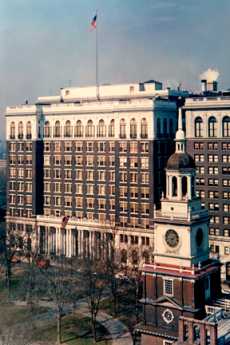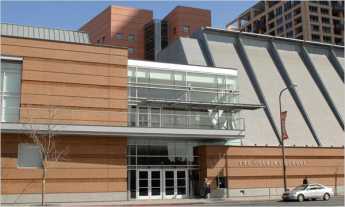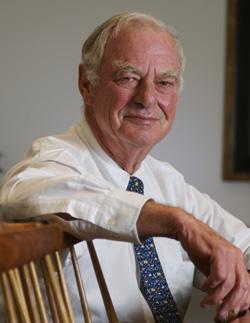Related Topics
Musical Philadelphia
Quakers never cared much for music, but the city has nonetheless musically flourished into international fame. At the same time, quarrels and internal battles have also been world class.
Curtis
To Cy Curtis, magazines were just vehicles for advertisers. In fact, his mags taught former farmers how to manage urban life, more or less accidentally creating a focus for American books, authors, politics and literature. The fall of his empire teaches the lesson that antitrust laws against vertical integration are probably unnecessary.
Cultural
Culture and Traditions (2)
Curtis Center

|
| The Curtis Center |
Tell your taxi driver that the Curtis Center is between 16th and 18th Streets on Locust, and not at 6th and Walnut. The big building next to Independence Hall is the former site of the Curtis Publishing Company, where all the money was made with the Saturday Evening Post. The Curtis Center is the present home of the Curtis Institute of Music, founded in 1924 by Mary Louise Curtis Bok with the advice of Leonard Stokowski, and with the determination to make it the best school of music in the world. The big competition, then as now, was the Juilliard School in New York, which is considerably larger. The New York competitor has the advantage that it sits on top of the Metropolitan Opera House within Lincoln Center. The Curtis, however, has a trump card; no student pays tuition, and the school tries to provide assistance for other costs of the students. Because of Juilliard's location closer to many performing arts centers, it can draw on a larger pool of commuting students and faculty, and is probably considered the top choice by the talented pool of applicants. But Curtis is gaining; only two of the accepted applicants from last year's class of 48 students chose to go to another school.

|
| Colburn School of Music |
In this fiercely competitive game, the school which is coming from the rearmost recently is the Colburn School of Music at UCLA. Not only does Colburn have Mr. Colburn's declaration in his will that he wanted to make it the "Curtis of the West", it is also heavily supported by Universal Studios, and has the additional advantage that Oriental students are flocking to the United States for musical training, and there are, of course, a lot of them. The previous director of Curtis is invited to China every year at the expense of the Chinese government, just to listen to what Chinese students sound like. It's sort of like inviting the college admission officer to your home to listen to your children describe their extra-curricular talents, but that's the way things are in the highly, highly competitive world of music. Running schools of music are no exception to that; don't forget music schools named for Peabody and George Eastman, and Boston's New England Conservatory of Music. Definitely a hobby for a person of means.

|
| Gerry Lendfest |
Like Gerry Lendfest, the Chairman of the Curtis Board. On his own, he bought the old Locust Club property and the two neighboring houses, and gave it to the Curtis if they would pledge to raise $35 million to fit it out. That's been done, and there is now a big hole in the ground across Locust Street from the Wannamaker Chapel of St. Mark's Church. The plan is to construct a five-story building on Locust Street in conformity to the wishes of the Planning Commission, but the building will rise to the level of a 9-story building on Latimer Street. Somewhere tucked in there will be an orchestra rehearsal center, a library, and many instrumental practice halls. Plus a dining room for everybody in the school, and about 85 dormitory rooms for students. Mr. Lendfest is obviously a keen competitor in the music school game.
The school has 85 faculty members for 165 students, half of whom come from overseas, and are male/female 50%. An occasional student is seven years old, in the style of Mozart, and every single student knows that just about every other student is just about as talented as he/she is. The test of it all is the careers of the students, who quite naturally fill up many of the places in the Philadelphia Orchestra. Famous graduates are Leonard Bernstein, Samuel Barker, Juan Carlo Menotti, Ephraim Zimbalist, and many others. There's little doubt that the original idea was to bring Central European music to America, but two world wars and the relentless pressures of outstandingly talented students have broadened the horizons to a modern vision of the future of music. One particularly significant development is the laying of fiber-optic cable from Temple to the Kimmel Center, and a planned branching to the Curtis Center. That's the new and improved Internet II, which will make virtual conducting of virtual orchestras all over the world a possibility. Keep tuned.
Originally published: Friday, July 24, 2009; most-recently modified: Thursday, May 16, 2019